When you add vodka to fermented vegetables, you'll notice significant changes in both texture and flavor. The alcohol disrupts the beneficial bacteria responsible for fermentation, potentially softening the vegetables while extracting and concentrating their flavors. While vodka can help preserve the vegetables, it may compromise the probiotic benefits and natural tangy taste that traditional fermentation provides. You'll need to evaluate proper storage methods, as the alcohol content doesn't eliminate all safety risks. For the best results, you'll want to understand how vodka's preservation method differs from traditional fermentation techniques before experimenting with this method.
Texture Changes in Vodka Soaking
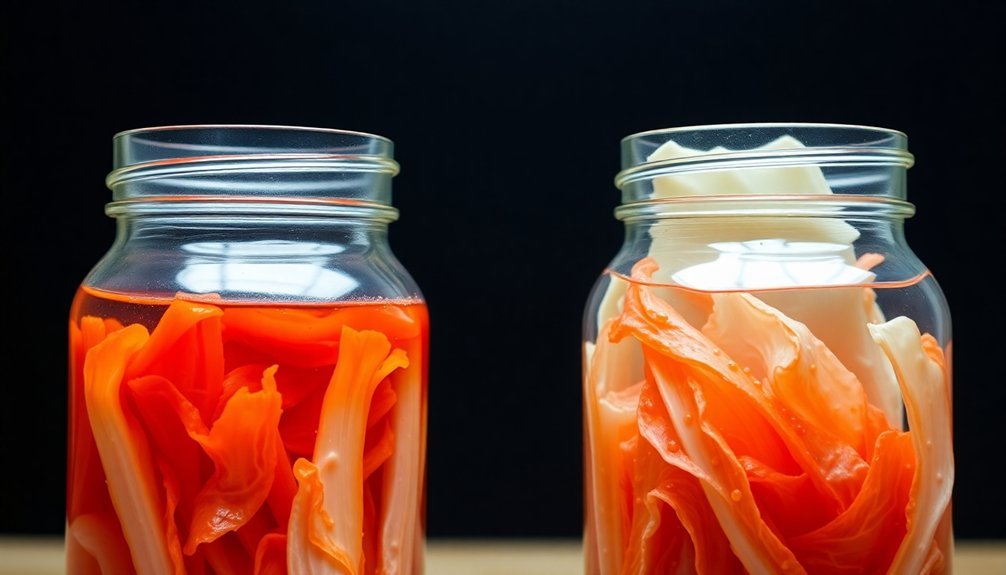
Contrary to popular experimentation, vodka plays no beneficial role in the texture development of fermented vegetables.
In fact, if you add vodka to your ferments, you'll likely disrupt the natural processes that create the ideal texture you're seeking. Traditional fermentation relies on salt, water, and beneficial bacteria – not alcohol – to achieve the perfect crunch and consistency. Heavy ceramic crocks and glass containers are the ideal vessels for proper fermentation.
When you're fermenting vegetables, the texture changes occur through a carefully balanced interaction between salt concentration and bacterial activity.
You'll get the best results by focusing on proper brining techniques and ensuring your vegetables stay fully submerged. The salt in your brine works to maintain vegetable firmness while preventing unwanted softening of the tissue.
If you're looking to control texture in your fermented vegetables, you'll want to focus on proven methods instead.
Keep your vegetables properly weighted down, maintain appropriate salt levels, and control the fermentation temperature. You can also influence the final texture through your preparation methods, such as how you cut or pound the vegetables.
Adding vodka will only interfere with the beneficial bacteria and potentially ruin your ferment.
Flavor Transfer and Infusion
Throughout the infusion process, vodka's unique properties make it a potent extractor of flavors from fermented vegetables. You'll find that while vodka isn't part of the actual fermentation process, it can enhance and concentrate the flavors of your already fermented vegetables when added afterward. The alcohol acts as a solvent, pulling out additional compounds that water alone can't extract. The process works especially well with vegetables that are rich in vitamin C, helping to further enhance their nutritional bioavailability.
When you're working with different vegetables, you'll notice varying results. Softer, more porous vegetables like cucumbers and carrots tend to infuse more readily than denser options like cabbage. If you're using harder vegetables such as beets or turnips, you'll need to allow for longer infusion times to achieve your desired flavor intensity.
Unlike traditional brining or salt-based methods, vodka infusion offers a unique approach to flavor extraction. It can help balance the acidity and saltiness of your fermented vegetables while preserving their probiotic benefits.
You can even combine vodka with additional spices and herbs to create more complex flavor profiles. While it's not a traditional method, vodka infusion gives you another tool for customizing your fermented vegetable creations.
Safety and Storage Considerations
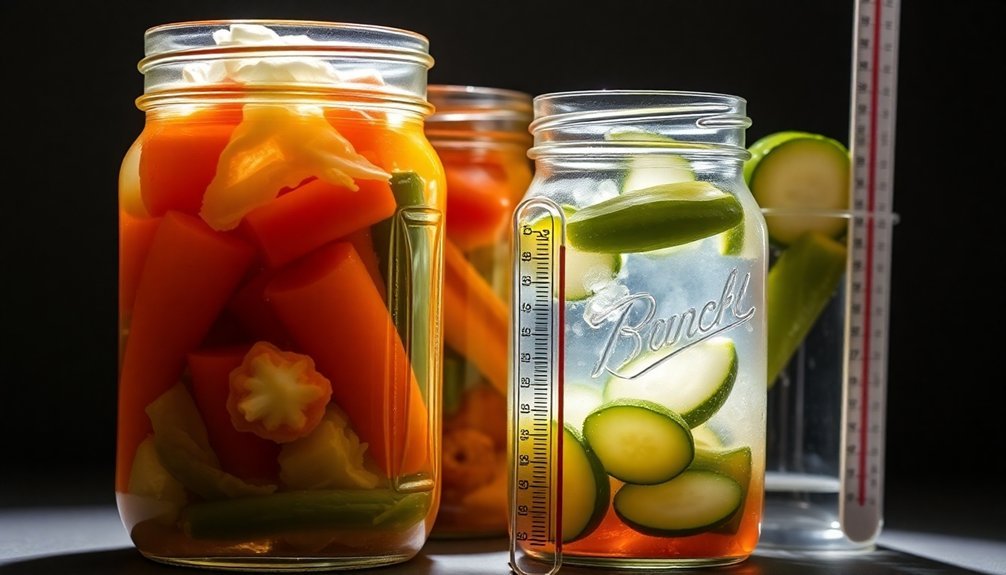
A vigilant eye on safety is essential when combining vodka with fermented vegetables. While vodka's alcohol content can help preserve your ferments, it won't eliminate all safety risks. You'll need to maintain proper acidification (pH 4.6 or lower) and follow strict sanitation practices to prevent pathogen growth. Traditional food preservation methods through fermentation have been used across cultures for generations.
| Safety Concern | Risk Factor | Prevention |
|---|---|---|
| Pathogens | E. coli, Salmonella, Listeria | Maintain pH below 4.6, proper sanitation |
| Biogenic Amines | Histamine, tyramine formation | Monitor fermentation time, proper storage |
| Surface Growth | Yeasts and molds | Keep vegetables submerged, use clean containers |
| Spoilage | Bacterial contamination | Regular pH checks, proper refrigeration |
When storing your vodka-infused ferments, you'll need to keep them refrigerated unless they've been pasteurized. Even with vodka's preservative properties, you shouldn't assume extended shelf life without proper testing. If you're experiencing headaches or digestive issues after consuming your vodka ferments, you might be sensitive to biogenic amines – consider reducing your portion sizes or discontinuing consumption. Always label your containers with preparation dates and storage instructions to maintain safety standards.
Microbial Effects and Preservation
Understanding vodka's impact on microbial activity reveals why combining it with fermented vegetables can be problematic. When you add vodka to your fermented vegetables, you're fundamentally disrupting the delicate microbial balance that's vital for proper fermentation. The alcohol content can inhibit or kill beneficial lactic acid bacteria, which are responsible for creating the acids that preserve and flavor your fermented foods.
You'll notice several key effects when vodka interferes with the fermentation process:
- Your fermentation process will slow down or stop completely, preventing the development of necessary organic acids.
- The beneficial bacteria won't be able to produce enough lactic acid, making your vegetables more susceptible to spoilage.
- Your vegetables won't develop their characteristic tangy flavor and may taste alcoholic instead.
- The preservation quality will be compromised, leading to a shorter shelf life.
You're also likely to experience texture changes in your fermented vegetables, as the disrupted fermentation process can result in softer, less crispy produce.
Without proper acid development, you won't achieve the same level of food safety that traditional fermentation provides, making it essential to avoid adding vodka to your fermented vegetables.
Original Fermentation Versus Vodka
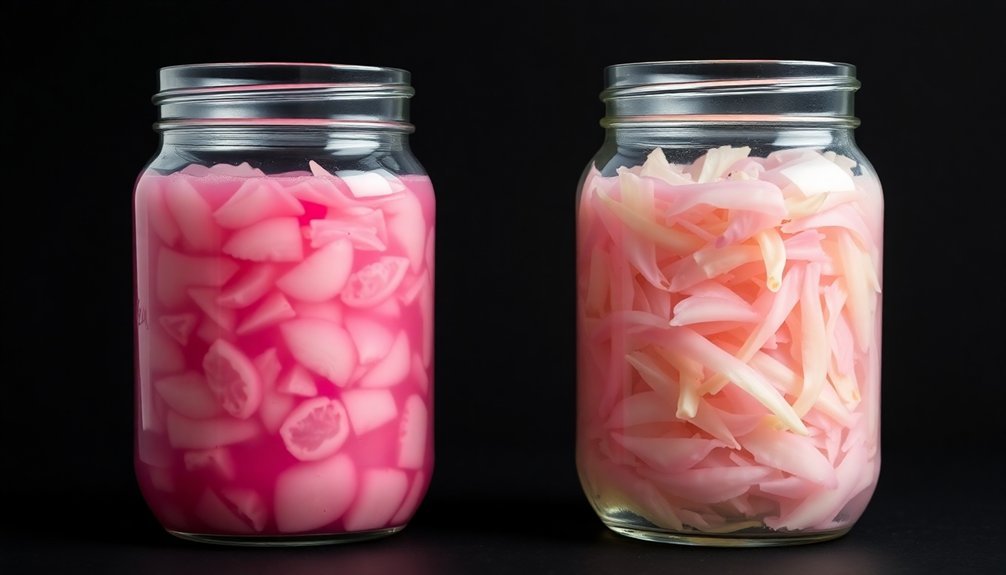
When comparing original vegetable fermentation to vodka production, you'll find two fundamentally different processes with distinct goals.
While vegetable fermentation relies on lactic acid bacteria to create probiotic-rich foods, vodka production depends on yeast to generate alcohol.
You'll notice that these processes operate under different timelines – vegetable fermentation can take several weeks to months, while vodka fermentation typically completes in one to two weeks.
The environmental conditions also differ greatly. You'll need to maintain room temperature for vegetable fermentation, but vodka production often requires more controlled temperature settings.
When you're fermenting vegetables, you'll simply mix them with salt and let the natural process occur. However, vodka production demands additional steps, including the essential distillation phase that concentrates the alcohol content from about 16% to a much higher percentage.
You'll find that the end products serve entirely different purposes. Your fermented vegetables will provide nutritional benefits and probiotics while maintaining their natural flavors.
In contrast, vodka production aims to create a neutral-tasting alcoholic beverage with minimal nutritional value but a considerably longer shelf life.
Frequently Asked Questions
Can Vodka-Infused Vegetables Be Used in Cooking Recipes?
You shouldn't use vodka-infused vegetables in cooking recipes. They're too alcohol-laden and have lost their original texture and flavor. The vegetables become unpalatable and could make your dishes unsafe to consume.
Does the Alcohol Content of Vodka Affect the Infusion Process?
Yes, your vodka's alcohol content directly impacts the infusion process. Higher ABV will extract flavors more quickly and efficiently, while lower alcohol content makes for a gentler, slower infusion of the vegetables.
Are Certain Types of Fermented Vegetables Better Suited for Vodka Infusion?
You'll find that robust fermented vegetables like garlic, onions, and spicy peppers work best for vodka infusion. Their strong flavors stand up well to alcohol, while delicate fermented veggies aren't as suitable.
How Long Can Vodka-Infused Vegetables Remain Safe at Room Temperature?
You shouldn't keep vodka-infused vegetables at room temperature for more than a few days. For better safety and longer shelf life, it's best to store them in the refrigerator to prevent spoilage.
Can the Vodka-Vegetable Mixture Be Reused for Multiple Infusion Batches?
You shouldn't reuse vegetables for multiple vodka infusions because they've already released most of their flavors in the first batch. You'll get weak results, and there's a higher risk of contamination with reused ingredients.
In Summary
When you add vodka to fermented vegetables, you'll find it affects both their texture and flavor profile. The alcohol will gradually firm up the vegetables while infusing them with subtle alcoholic notes. You'll need to monitor the storage carefully, as vodka can slow down but won't stop the fermentation process entirely. For the best results, keep your vodka-preserved ferments refrigerated and consume them within a few months.

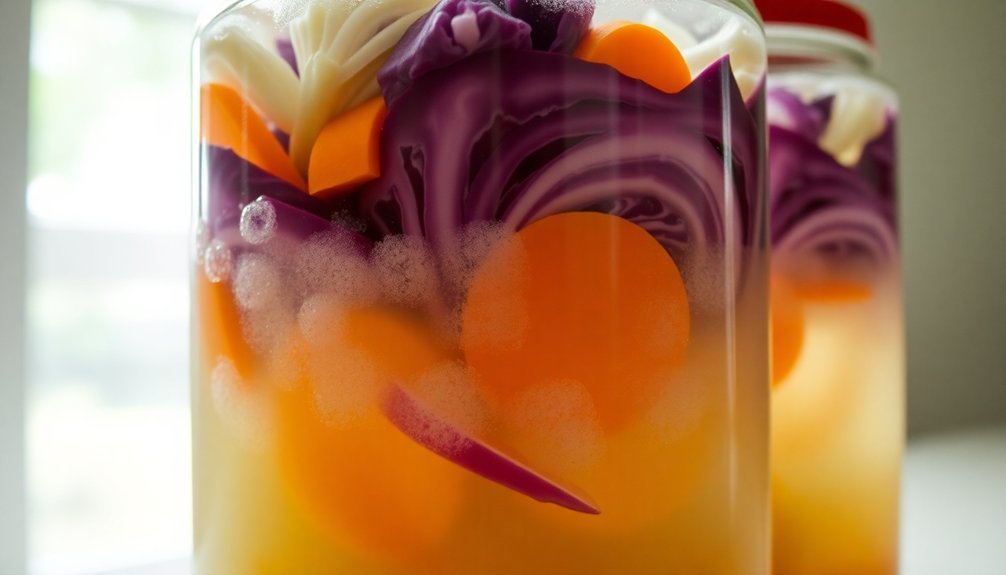
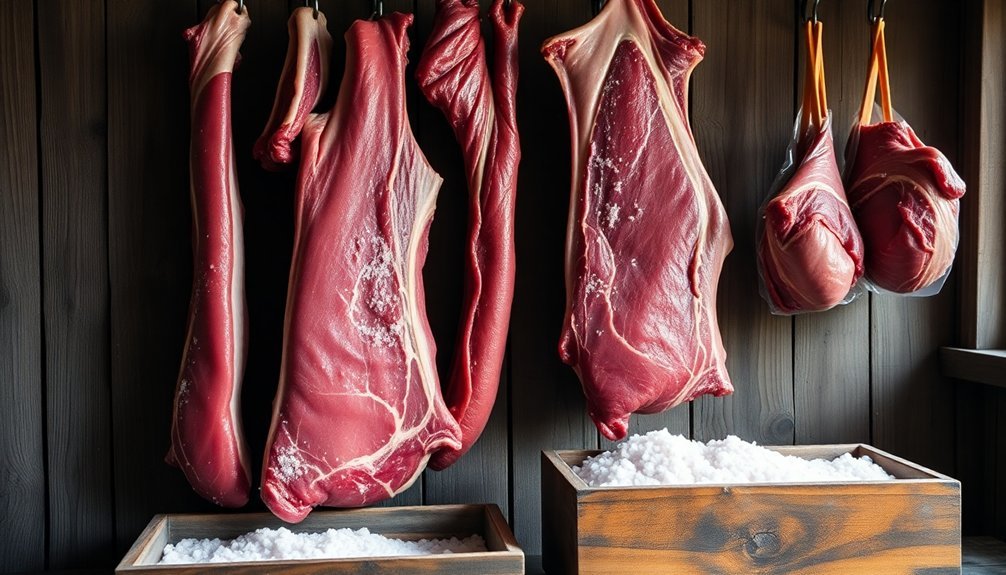
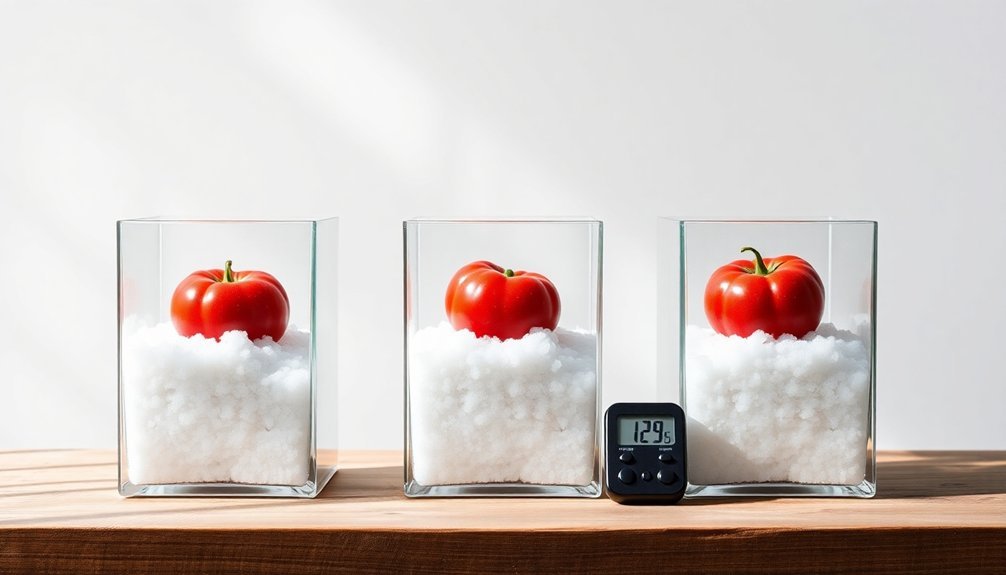
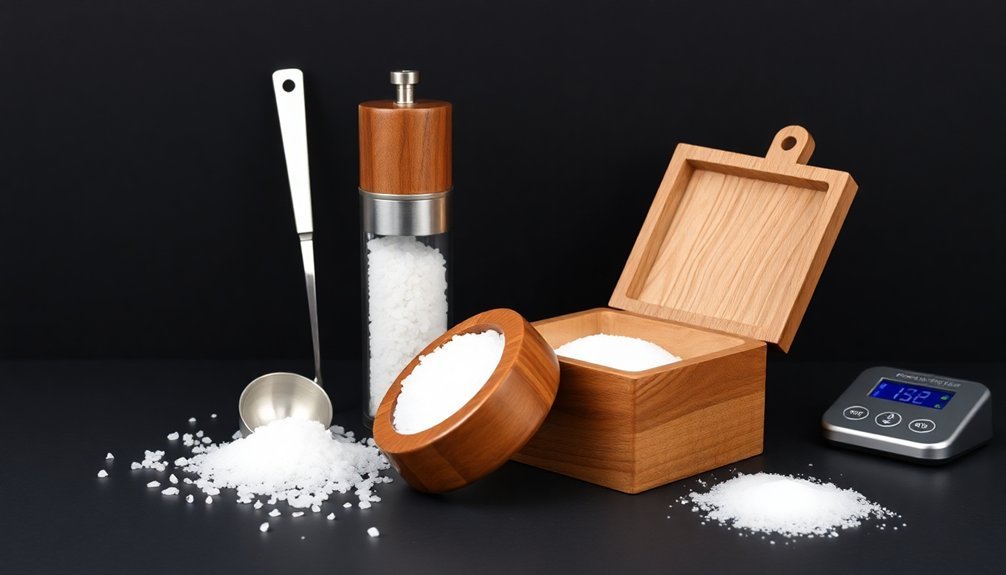
Leave a Reply